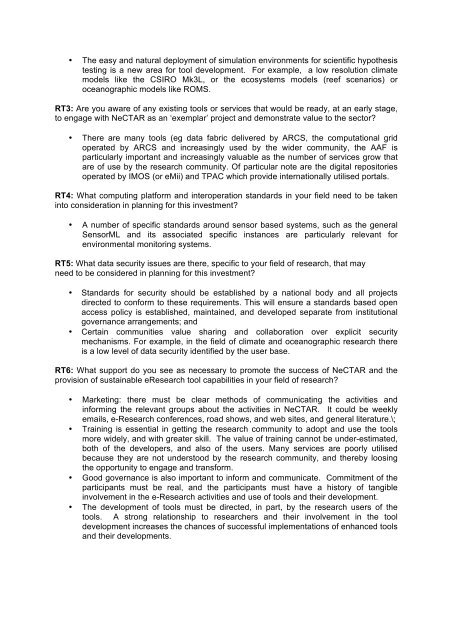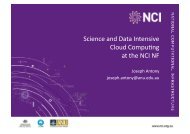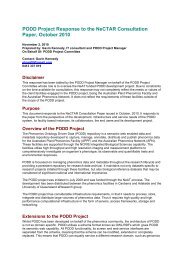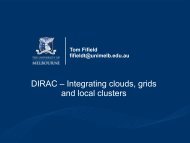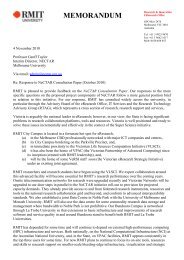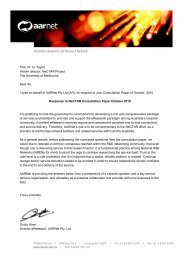UTAS - NeCTAR
UTAS - NeCTAR
UTAS - NeCTAR
Create successful ePaper yourself
Turn your PDF publications into a flip-book with our unique Google optimized e-Paper software.
• The easy and natural deployment of simulation environments for scientific hypothesis<br />
testing is a new area for tool development. For example, a low resolution climate<br />
models like the CSIRO Mk3L, or the ecosystems models (reef scenarios) or<br />
oceanographic models like ROMS.<br />
RT3: Are you aware of any existing tools or services that would be ready, at an early stage,<br />
to engage with <strong>NeCTAR</strong> as an ‘exemplar’ project and demonstrate value to the sector?<br />
• There are many tools (eg data fabric delivered by ARCS, the computational grid<br />
operated by ARCS and increasingly used by the wider community, the AAF is<br />
particularly important and increasingly valuable as the number of services grow that<br />
are of use by the research community. Of particular note are the digital repositories<br />
operated by IMOS (or eMii) and TPAC which provide internationally utilised portals.<br />
RT4: What computing platform and interoperation standards in your field need to be taken<br />
into consideration in planning for this investment?<br />
• A number of specific standards around sensor based systems, such as the general<br />
SensorML and its associated specific instances are particularly relevant for<br />
environmental monitoring systems.<br />
RT5: What data security issues are there, specific to your field of research, that may<br />
need to be considered in planning for this investment?<br />
• Standards for security should be established by a national body and all projects<br />
directed to conform to these requirements. This will ensure a standards based open<br />
access policy is established, maintained, and developed separate from institutional<br />
governance arrangements; and<br />
• Certain communities value sharing and collaboration over explicit security<br />
mechanisms. For example, in the field of climate and oceanographic research there<br />
is a low level of data security identified by the user base.<br />
RT6: What support do you see as necessary to promote the success of <strong>NeCTAR</strong> and the<br />
provision of sustainable eResearch tool capabilities in your field of research?<br />
• Marketing: there must be clear methods of communicating the activities and<br />
informing the relevant groups about the activities in <strong>NeCTAR</strong>. It could be weekly<br />
emails, e-Research conferences, road shows, and web sites, and general literature.\;<br />
• Training is essential in getting the research community to adopt and use the tools<br />
more widely, and with greater skill. The value of training cannot be under-estimated,<br />
both of the developers, and also of the users. Many services are poorly utilised<br />
because they are not understood by the research community, and thereby loosing<br />
the opportunity to engage and transform.<br />
• Good governance is also important to inform and communicate. Commitment of the<br />
participants must be real, and the participants must have a history of tangible<br />
involvement in the e-Research activities and use of tools and their development.<br />
• The development of tools must be directed, in part, by the research users of the<br />
tools. A strong relationship to researchers and their involvement in the tool<br />
development increases the chances of successful implementations of enhanced tools<br />
and their developments.


